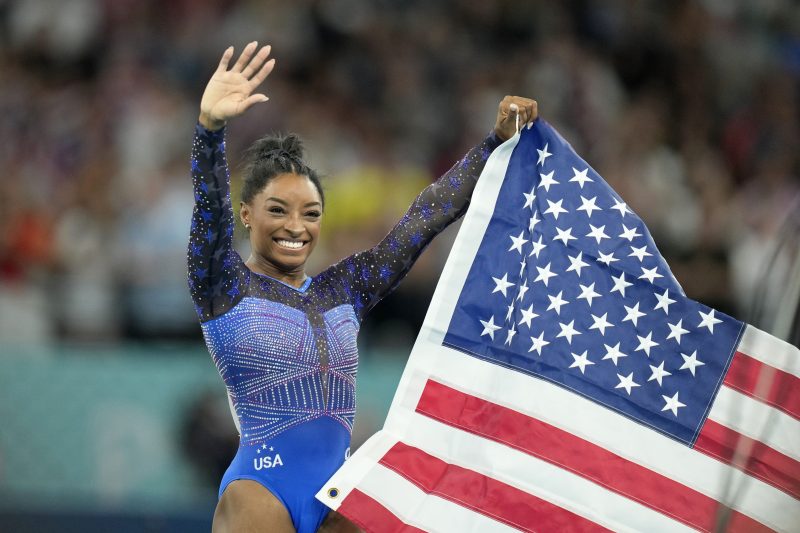PARIS — Simone Biles is the best to ever do it and it’s not even close.
In her sport. And in all others.
Michael Phelps, Usain Bolt, Serena Williams and anyone else you want to throw in the mix — they all take a backseat to Biles. With her second Olympic all-around title Thursday night, Biles surpassed all the other GOATs. She’s now, as teammate Jordan Chiles put it earlier this week, the greatest of the greats.
‘It is crazy I am in the conversation of greatest of all athletes,’ Biles said. ‘Because I just still think I’m Simone Biles from Spring, Texas, that loves to flip.’
Like other transcendent athletes, Biles has has piled up stats that are unmatched. She is the third woman to win two Olympic all-around titles and first to do it in non-consecutive Games. She has nine Olympic medals, six of them gold. A total of 39 medals at the world championships and Olympics, more than any other gymnast, male or female. Six world titles, twice as many as the next woman.
Get Olympics updates in your texts! Join USA TODAY Sports’ WhatsApp Channel
And a winning streak that’s lasted so long that teammate Hezly Rivera has gone from a kindergartner to a Paris Olympian during the stretch, while Biles has gone from a teenager with braces to a married woman in her late 20s, stunning longevity in a sport that has long chewed gymnasts up and spit them out by their 18th birthday.
What sets Biles apart, however, is both the basic rigors of her sport and how she’s transformed it.
No disrespect to Phelps, Bolt, Williams or any of the others, but the average person can do what they did. Not as well, of course. But you can get in the pool and swim a lap like Phelps did. You can go out to a track, or a sidewalk, and run like Bolt did. You can go to a court and hit a tennis ball, like Williams did.
Ask the average person just to flip on the balance beam or do a simple vault, however, and you better have an ambulance on standby. And Biles does her thing with more ease and grace than most of us can muster walking to the bathroom.
On uneven bars Thursday night, Biles was too far away from the high bar on one skill, and it altered her momentum on the transition to the low bar. She had to bend her legs so she wouldn’t scrape them against the mat, then barely caught the bar. She didn’t fall, but all those deductions in that few second span were almost as costly. Her score of 13.733 dropped her behind both Rebeca Andrade of Brazil and Kaylia Nemour of Algeria. Worse, it was on to balance beam next, and Biles was up first.
Imagine the pressure of that: The all-around title hangs in the balance and your performance on an apparatus that’s as wide as an iPhone and 4 feet in the air will likely be the difference maker. Many an athlete would have folded in the situation, but Biles nailed her routine, her aerial series landed with such confidence she might as well have been doing it on the flat ground.
She scored a 14.566, putting her back into first place. She brought down the house with her high-flying — literally — floor routine, soaring some 10-plus feet in the air while flipping and twisting. Though she took a few steps on the landings of her Biles II, the first pass in the routine, she stayed in bounds, effectively clinching the gold.
‘I was stressing!’ Biles said. ‘But I knew if I did my work, it’d all be fine.’
Biles also has won with a stunning display of versatility. Williams wasn’t also playing squash. Bolt wasn’t running marathons. Phelps specialized in the butterfly, freestyle and IM — half of which is fly and free.
Each of the gymnastics events requires a very different skill set — power on vault and floor, strength and fluidity on uneven bars, precision and grace on balance beam — yet Biles excels at all of them. In addition to her all-around titles, Biles has world titles on vault, balance beam and floor exercise.
She won a medal on every event at the 2018 world championships, adding a silver on uneven bars to her golds on vault and floor and bronze on beam. Earlier this summer, she swept every event title at the U.S. championships.
The biggest difference, however, is how Biles has changed her sport. Sprinting isn’t different than it was before Bolt came on the scene. Ditto for swimming. Women might be stronger and serve faster, but the game of tennis is otherwise unchanged.
But Biles is pushing the boundaries of her sport, doing tricks no one else will even try. She has five skills named after her, including the Yurchenko double pike vault that is so difficult few men do it. It’s not only that she did these things first. They’re so advanced – so hard – few have been able to match her.
She first did her Biles I on floor exercise – a double layout with a half-twist – way back in 2013. On Sunday, another gymnast did it at the Olympics for the first time.
All this, and we haven’t even gotten to what Biles has done outside gymnastics.
Her nightmare in Tokyo, where ‘the twisties’ caused her to lose her sense of where she was in the air, exposed the mental health struggles that for far too long were the dirty little secret of elite athletics. By withdrawing one event into the Tokyo team final, and then missing four individual event finals, she made it OK for everyone else not to be OK.
‘I was so nervous about getting injured physically that I neglected my mental health,’ Biles said. ‘Then I was injured, except it was a mental injury and I think that was almost harder than physical. Whenever you go to the doctor and you have a physical injury, they tell you three to six weeks, three to six months.
‘This, it was like no time tells,’ said Biles, who prioritizes her weekly therapy sessions and had one at 7 a.m. Thursday. ‘To see where I’ve grown, even from Tokyo, even from the 19-year-old from Rio, is amazing. I’m really proud of the work that she’s put in, because I never thought I’d be on a world stage again.’
Now she’s not only on the world stage, she owns it. The GOAT of all GOATs.
Follow USA TODAY Sports columnist Nancy Armour on social media @nrarmour.






